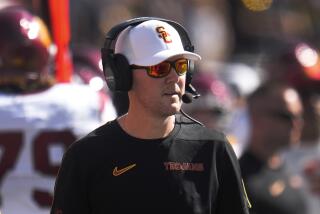With playoff off the table, it took major networking
In college football circles, the story of how the BCS began often starts with the cocktail napkin.
It was the early 1990s, and Tom Mickle, second-in-command of the Atlantic Coast Conference, sketched out a framework for matching No. 1 against No. 2 in a bowl game. His boss, Gene Corrigan, took that cocktail napkin with its multi-bowl road map to other conference commissioners. Out of that came the Bowl Alliance, precursor to the BCS.
And the story usually ends there.
But missing from that alliance were the Big Ten and Pacific 10 conferences. No Ohio State. No USC. No Michigan. No Penn State. No UCLA.
Love it or hate it, the creation of the Bowl Championship Series solved that problem.
One of the people most responsible is one who has gone unsung -- Tony Petitti, the man now in charge of running the day-to-day operation at CBS Sports.
Petitti in the fall of 1995 was vice president of programming for ABC and wanted to find a way to boost interest in the network’s college football coverage.
“To be honest, we didn’t have a plan in mind,” Petitti said in a recent phone interview from his office in New York. “But we knew what we wanted -- a system that would guarantee matching the No. 1- and No. 2-ranked teams in a championship game at the end of the season.”
Already in place was the Bowl Alliance, which involved the Orange Bowl, Fiesta Bowl and Sugar Bowl, and the Southeastern, Atlantic Coast, Big 12 and Big East conferences.
The Pac-10 and Big Ten were off by themselves, having been contractually linked to the Rose Bowl for nearly half a century.
ABC had the Rose and Sugar, CBS the Orange and Fiesta.
Petitti, looking back, calls it a “hodgepodge system.” So he set out to create something better. The conference commissioners and school presidents opposed a playoff, so that was out.
And Petitti knew there would be no way to guarantee No. 1 would play No. 2 without the Pac-10 and Big Ten.
The first thing Petitti and Dennis Swanson, then president of ABC Sports, did was set up a meeting in Pasadena with Pac-10 Commissioner Tom Hansen, Big Ten Commissioner Jim Delaney, and Rose Bowl committee chairman Harriman Cronk, along with other Rose Bowl officials.
It did not go well.
“They thought we were simply going to offer a straight renewal for more money,” said Petitti, a 1986 graduate of Harvard Law School. “So when we proposed breaking up the Pac-10/Big Ten alliance, that caught them off guard.”
Petitti and Swanson needed allies and found one in Roy Kramer, then the SEC commissioner. They met at that season’s SEC championship game.
Kramer liked what he heard, and it was Kramer, according to Petitti, who was able to get all the conferences on board.
Of course, money helped.
ABC was paying about $12 million a year for TV rights to the Rose Bowl. A bump up to $18.5 million helped persuade Cronk and other Rose Bowl officials, along with Hansen and Delaney, to join what was initially called a “super bowl alliance.”
Cronk remembers it wasn’t easy. “At first, there was tremendous pressure on me and everybody else to keep the Pacific 10 and Big Ten in the Rose Bowl,” he said. “But, and that’s an enormous but, we eventually realized that making sure the No. 1- and No. 2-ranked teams play for a national championship was what was most important.”
Petitti and Swanson faced the next hurdle -- getting the four major bowl games all on ABC. But CBS had long-term contracts with the Orange and Fiesta bowls.
“What we did was make deals with the conferences to get their champions on ABC, regardless of where the game was played,” Petitti said. “That left the Orange Bowl and the Fiesta Bowl without conference champions. CBS wasn’t interested in televising those games without conference champions, so they released them.”
Petitti also wanted the championship game to rotate among the four BCS bowl games.
Petitti said that by spring 1996, he was continually flying from meeting to meeting and tweaking his system. Around that time, Steve Bornstein replaced Swanson as president of ABC Sports but supported Petitti’s efforts.
On July 23, 1996, what would come to be known as the BCS was announced. It would take effect with the 1998 season.
In all, ABC agreed to pay out $518 million over seven years.
That seven years was up last season, and now Fox has the Fiesta, Orange and Sugar bowls, plus the BCS championship game, which this season will be played at the site of the Fiesta Bowl on Jan. 8. The Rose Bowl remains on ABC.
Petitti, who joined CBS in February 1997, said he has never attended a BCS bowl game.
Kramer, who retired from the SEC in 2003, is often referred to as the father of the BCS.
“If that is the case,” he said from his home in Vonore, Tenn., “then Tony is the No. 1 son.
“Tony is the one who did most of the legwork.”
Said the Pac-10’s Hansen: “What Tony did was go from conference to conference, from bowl to bowl to put it all together.”
Said Kramer: “What we were trying to find was a way to create more interest during the regular season, and I think that is the most successful part of the BCS.
“Look at the interest in the Michigan-Ohio State game. There wouldn’t have been that much interest had we had a playoff system in place.”
According to Kramer, another objective was to protect the bowl system.
“A lot of people in the media might not agree, but the bowl system is very important to college football,” he said. “A team like, say, Iowa State may never get a chance to play for a national championship. But it can go to a bowl game, and that generates interest among its fans.”
So, the cocktail napkin story lives on, though its creator, Mickle, died in April of a heart attack at 55. And the BCS lives on, though it has been called everything from “ridiculous” to “convoluted.”
“It’s not a perfect system,” Petitti said. “But it is better than what we had before. I have to say, I’m proud of it.”
He concedes a playoff system would be better.
“It’s the last great sporting event to be created,” he said.
*
More to Read
Go beyond the scoreboard
Get the latest on L.A.'s teams in the daily Sports Report newsletter.
You may occasionally receive promotional content from the Los Angeles Times.










